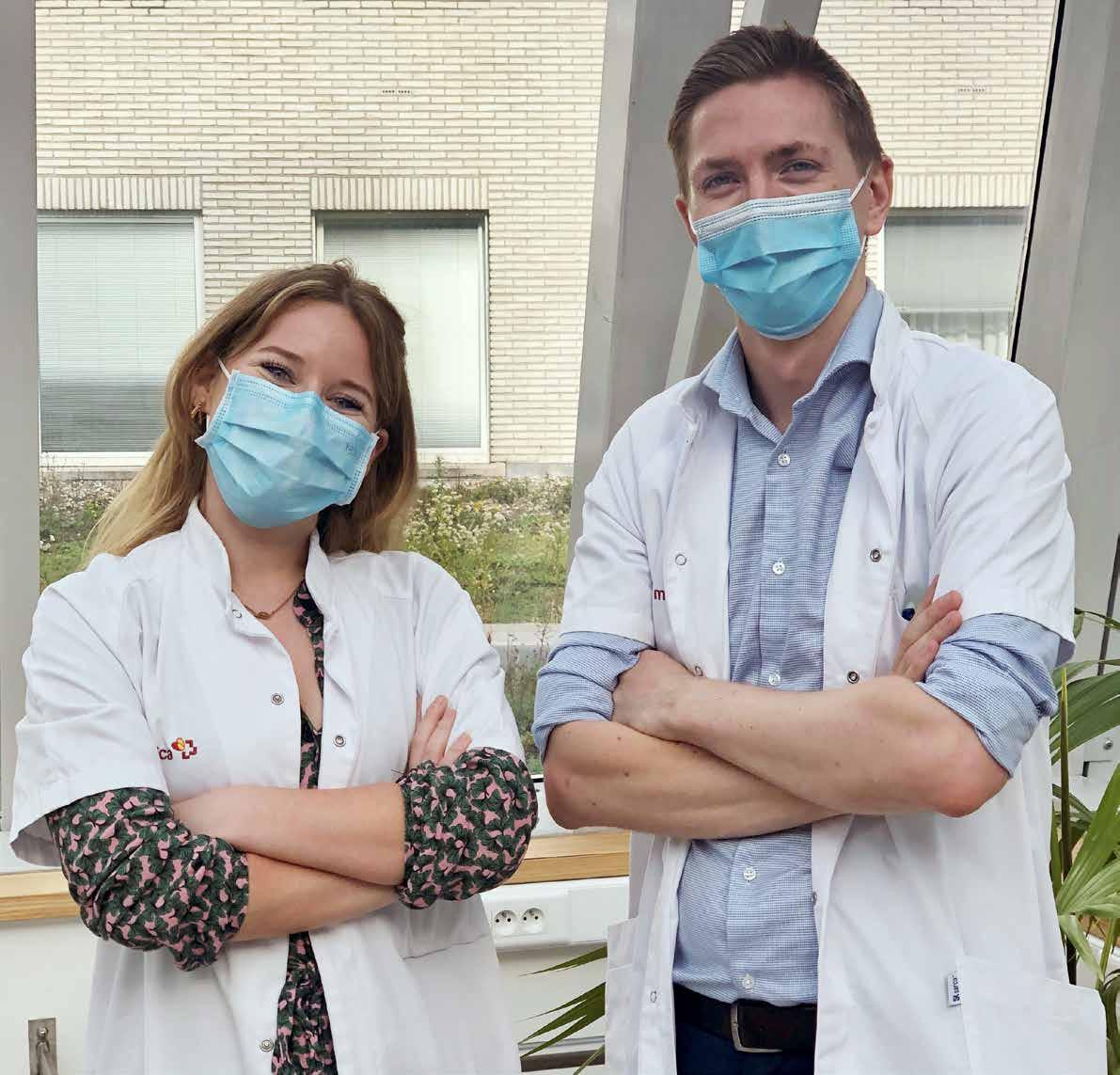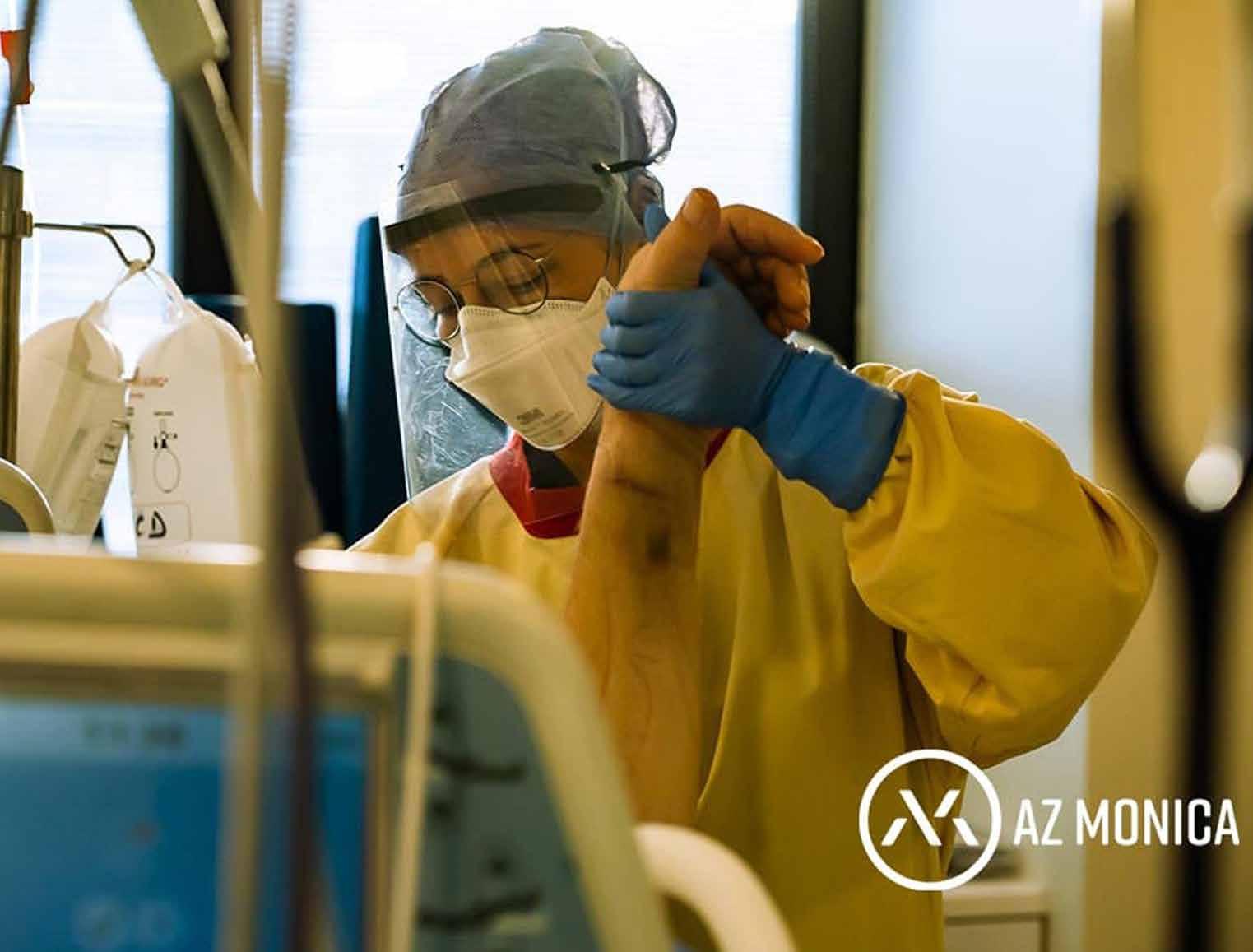
9 minute read
Reflections of Young Residents Fighting Covid-19
ROSE BRUFFAERTS AND LIES LAHOUSSE
As junior residents in internal medicine, with only six months of clinical practice, Michiel Beyens and Faro Verelst witnessed the outbreak of the pandemic from the frontline. In no time they were recruited at the Covid-19 wards. A new chapter in their medical training began. They were constantly balancing providing good medical care and trying to effectively protect themselves against the virus. Nothing during their medical training had prepared them for an outbreak of such proportions. Michiel, Faro and their colleagues wrote a moving testimony about their experience, which they submitted in response to the Young Academy's contest.1 As they describe, feelings of uncertainty very much prevailed in this first stage of the pandemic. In December 2020, during the second wave, Maja invited them to look back on their experience.
Advertisement
Your text strongly suggests that you were sent into the lion’s den. Did you see that as an opportunity or were you both also fearful of what awaited you?
michiel: It’s not like we were alone in this: this situation was also completely new to our supervisors, the consultants. They may have had more experience, but in this case, they too were insecure. This contributed to a special group feeling. For example, cardiologists would come and help out the pneumologists on the Covid-19 ward. This extra multidisciplinary team effort did bring the entire hospital closer together.
faro: Many of them would be on the Covid-19 ward only occasionally. We were there full-time and so we became the ‘hands-on’ experts. We received input from everyone who had learned something about Covid-19, which was very instructive, and on top of that everyone shared their specific knowledge with us. It was nice to think about a patient together with many other doctors. It led to knowledge integration.
michiel:During the first wave, the regular daily rush in the clinic was gone: many consultations and imaging procedures completely stopped, leaving more time to consult with each other. In addition, we were able to provide extra input based on our own experience with other patients. Our supervisors were very open to that input.
Drs. Faro Verelst (L) and Michiel Beyens (R)
And was this solidarity something that remained?
faro: By now, everyone is focusing more on their own discipline again. Regular healthcare has started up again, which of course is very positive! Now, during the second wave, the residents, the consultants-in-training, are on duty more often. We no longer have the assistance of the medical specialists from other disciplines and this extra work now becomes our burden. Sadly, the group spirit from the first wave has disappeared somewhat.
michiel: In the hospital where I am currently working, a creative solution was found by calling upon the surgery residents, in addition to the internal medicine residents. Under normal circumstances there is not much contact among us. They took some of the workload from us, which was very positive and nice.
Care workers may be apprehensive about the possibility of transmitting the virus to their family members. Was that a concern for you?
michiel: Definitely. I was mostly afraid of contaminating my parents, so we maintained a very strict distance. Even now we don’t see each other often. It’s hard, as I miss them. But I wouldn’t forgive myself if I infected my own mother.
faro: This was especially so during the first wave. When I came home, the first thing I always did was take a shower. I am more relaxed about it now, but naturally you wish to prevent infecting a family member at all cost. One has a responsibility to one’s patients, but also to one’s family. Care workers are punished somewhat extra because they can meet fewer people than others. It is a mixed feeling.
Did it change you as doctors?
michiel: I have seen many people die, especially older people, over a brief period of time. It makes you think more about how to give the best palliative care. You start to realize how fast things can happen. Even with old people who were quite fit before, are very vulnerable to the virus.
faro: One thing we learned is that informing the family is extremely important. The worst part is accepting the strict rule that they cannot visit the patient. I understand the need for this rule, but family members are worried. And when the patient dies, it can be very difficult for them to accept this because they haven’t seen their loved one anymore. Normally, in a dying process, people notice the condition of their loved one deteriorating
and that makes it easier to accept than when it all takes place suddenly and behind closed doors.
Should that be an item in your training? Should there be more attention to palliative care and communicating with family?
michiel: It certainly merits more emphasis. For example, we had to ask people of 92 who arrived in the emergency room in an unstable condition whether they had already discussed issues of their life’s end with their family doctor. Having that conversation at that moment is not a matter of course.
While lacking obvious therapeutic treatments, you attempt to provide the best possible care. Still, you are confronted with obvious limits that perhaps do not occur in other pathologies. Did this pandemic influence your job satisfaction?
faro: Working on the Covid-19 ward and wearing that suit creates a physical distance to your patients. Under normal circumstances, patients will recognize you in the corridors, they know who you are and what you did for them. Not this time. I treated one seriously ill patient for four weeks who in the end pulled through. But when this patient later came in for a regular consult, he didn’t recognize me. I find this regrettable: the interesting thing about my work is to be close to people. That closeness is no longer there, if only because of that suit.
You may survive these moments of crisis purely on adrenaline, but have you been able to find any time to relax mentally in the past year?
faro: Very little. On the Covid-19 ward no one dared to take leave, as there was always the possibility that the ward would overflow in the week to come. This short period around the holidays was also busy, and now the second wave is back in full force. michiel: When the peak was over, we could let off some steam. Just before the second wave, I had booked a one-week holiday, but then one of my colleagues fell ill. I did feel guilty about taking a holiday, but other people said: “You’d better go now, as you may not get a second chance.”
faro: That was the scary thing about the first wave. When you’re young you sometimes feel invincible. You don’t really believe you can become seriously ill. But then we saw colleagues who did really become ill. We started this pandemic feeling invincible, but gradually we realized that the picture wasn’t all rosy for young people either.
How do you deal with images in the media and social media or with events in society where people do not follow the rules?

faro: In July, after a difficult period of hard work, I saw many friends posting on social media about travelling, even to regions that had ‘code red’. I tried to tell them that we still had to be careful. As care workers we are supposed to be very responsible. That’s a good thing, but if you then see people not taking any responsibility, I can help but feel disappointed.
michiel: As long as people agree that they should limit their contacts with others and stay home when they feel ill, it’s fine with me. But on the Covid-19 ward I’ve also had patients who hadn’t taken these precautions. I don’t mind confronting them: “By travelling and meeting friends while you were already ill and coughing, you have put your friends and family at risk.” This may give them something of a shock, but I think it’s good for people to reflect on this. The clinical picture of this disease is strange, though. Sometimes you may think it’s not so bad when you see patients making a quick recovery and so I do understand why some people wonder why our entire society must be put on hold for this. At other times, reality hits… Just the other day we had to put a thirty-year old patient to sleep who will likely wake up with a lung transplant. It can often be so extreme. The media sometimes imply that people are being scared, but I feel that it is sometimes necessary to make them see how serious the situation is. We are right in the middle of it, which is of course different from the remote experience of it that most people probably have.
What is the most important thing to remember from this crisis and keep in mind for the future, according to you?
michiel: It used to be that co-workers often still came to work when they had a fever, simply because they were on duty and thought that no one else could take over their shift. Covid-19 has made us more keenly aware that this is really not okay. This may mean that people stay home sooner when they are not feeling well, but I think we should be flexible
MICHIEL BEYENS studied medicine at the University of Antwerp. He started his medical career as a resident in internal medicine in October 2019 and has a specific interest in rheumatology and immunology. At the start of the pandemic, he was working as a first-year resident in the gastro-enterology service in Deurne at the AZ Monica Hospital, together with Faro Verelst.
FARO VERELST studied medicine at the University of Antwerp and is a resident in internal medicine. During the first wave of the pandemic, she worked in the Covid-19 unit in Deurne at the AZ Monica Hospital together with Michiel Beyens. Right now, she is a resident in internal medicine in Antwerp at the ZNA Stuivenberg.
about that. When you’re feeling ill, you have to stay home in order to protect others.
Do you have any messages for your younger colleagues? What message should Maja definitely bring to young researchers and young residents?
faro: All things pass. I wish to hearten everyone. It is important not to give up hope. This is a difficult period, but we are writing history here. This is not a regular experience and it asks a lot of us as care workers and as individuals, but we do learn from it.
michiel: Team spirit accomplishes more than people think. Fortunately, there are also positive sides to living in this pandemic.








